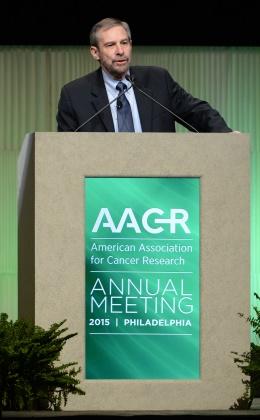At NCI, A Continued Commitment to Supporting the Best Science
, by Douglas Lowy, M.D.
Yesterday, at the annual meeting of the American Association for Cancer Research (AACR), I had my first chance to speak directly to the research community in my new role as NCI Acting Director. It’s an honor to serve in a position that’s been held by so many esteemed scientists, and it was indeed an honor and a thrill to address attendees at one of the premier cancer research meetings held each year.
Following in the steps of such a distinguished scientist and committed advocate for biomedical research like Harold Varmus is a challenge by any measure. During his 5 years at NCI, Harold led the NCI through some difficult times, all while overseeing the launch of a transformed clinical trials system and initiating many important new initiatives and programs—providing a road map for what I and many others believe can be an era of unprecedented progress.
The establishment of the Center for Cancer Genomics and Center for Global Health, for example, has helped to centralize and invigorate the Institute’s activities in both of those arenas. The Provocative Questions and RAS Initiative are spurring innovative approaches to problems that have long stymied researchers, in some cases for decades. And the Outstanding Investigator Award is helping to ensure that our best investigators can spend their time pursuing cutting-edge science and potentially fruitful or unexplored avenues for progress, rather than constantly preparing grant applications.
As Acting Director, I plan to continue the vast majority of these programs and to continue NCI’s commitment to supporting the best science. I also hope to sharpen our focus in several areas where I believe greater progress can offer significant dividends.
I’m especially enthusiastic about President Obama’s Precision Medicine Initiative (PMI), a large component of which is devoted to cancer and will be run through NCI. We already have a series of precision medicine trials in the works, and the PMI will allow us to more rapidly reach a point where precision therapy is the norm for most cancers.
The concept of precision medicine is primarily considered under the rubric of treatment. But the greater molecular and mechanistic understanding of cancer that we are gaining—and applying toward the development of new therapies—is also directly applicable to the first area where I believe we can bring greater focus to our efforts: prevention and screening. This includes ongoing efforts to identify and validate biomarkers that can identify cancer at its earliest stages or identify those at particularly increased cancer risk.
Although we already have a robust portfolio of cancer health disparities research, this is another area where I believe we can bring sharper focus to our work. Cancer health disparities are generally attributed to three key factors: biology, lifestyle and environmental factors, and health care access and utilization. Although we cannot address every facet of these contributing factors, I believe that we can better target our efforts to what we consider to be the most serious and important, and try to both better understand them and develop and test ways to mitigate them.
Finally, the third area where I believe we can sharpen our focus is the support of basic research. Nearly half of NCI’s budget funds basic research, so our commitment to it is clear.
That said, there may be a sense in the cancer community that our support of basic research extends only to work that has immediate translational potential—that is, studies that have obvious and immediate implications for the development of new diagnostics, therapies, or other interventions. My own view, and one that I think NCI should embody, is that translational potential is extremely difficult to divine. Many of our breakthrough discoveries have, and will continue to be, the result of research that many would not consider to have translational potential.
This is a critical point to emphasize, particularly for our young investigators, that as the leader of the National Cancer Program, NCI will support outstanding research and researchers. The results have, and will continue, to speak for themselves.
I’ve only been on the job for a few weeks, but already I’ve received more calls, emails, and even personal visits offering well wishes and support than I could have ever expected. It has reaffirmed for me that—although we don’t always agree on how best to proceed in certain areas or address our biggest challenges (or even on what those challenges are!)—those who are committed to cancer research and its ultimate goal of reducing the cancer burden will ultimately work together to achieve our ends.
